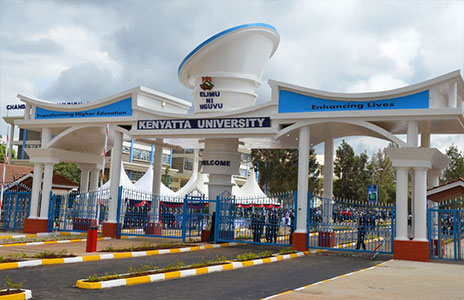
The Bachelor of Science in Agribusiness Management degree program combines knowledge of business management and agricultural systems with an understanding of how the market economy works and the appropriate role of government regulation. BSc in Agribusiness Management program combines, economics and business studies disciplines to produce graduates in Agribusiness Management who will contribute to the economic development process by applying their skills in agriculture-based enterprises and agro-based industries in Kenya and the world over. Recent development concerns and trends incorporated in this program include globalization, industrialization, agricultural products value chain development, private sector development and participation in agribusiness development and management, sustainable development, and mainstreaming environmental and gender issues in the program content.
Liberalization of trade and the new millennium revolution in communication and information technology has opened up novel opportunities in agricultural trade and related business collectively called agribusiness. Consequently, there is a growing demand for training of skilled human resources to be deployed as leaders and professional practitioners in agribusiness management.
Career Opportunites
The graduates in Agribusiness Management will possess versatile profiles that will enable them to manage business enterprises become researchers, trainers, and be self-employed entrepreneurs, running their own business ventures among others.
Agribusiness Management graduates will be able to help clients make the best possible use of resources and services already available to them by:
- Changing their knowledge base so as to increase allocative efficiency in resource use.
- Changing their outlook and attitudes through the development of skills and capacity for work.
- Providing them with training and know-how for problem identification, solution, and decision making.
Entry Requirements
For admission into the BSc In Agribusiness degree program, the candidate must meet the following minimum requiremetns:
- K.C.S.E. candidates need minimum requirements of mean grade C+ (plus)
- With a C or above in Biology or Biological Sciences, Physics and Chemistry or Physical Sciences and Mathematics.
- Candidates taking Physical and Biological Sciences the fourth subject may be selected from Geography, Building Construction, Home Science, Power Mechanics, Agriculture, Electricity, Wood Work, Drawing and Design, Metal Work and Aviation Technology.
- Admission to the degree course may be granted to holders of KACE with two principal passes in science subjects and at least a credit in mathematics at O-level;
- holders of diploma in agricultural or business-related subjects;
- holders of a degree and a Higher National Diploma with a C- in KCSE.
Objectives of Bachelor of Science in Agribusiness Management
The general objective of the Bachelor of Science in Agribusiness Management degree program is to produce a specialist graduate with strong foundations in agribusiness knowledge and management to effectively serve both the private and public sectors of the economy. The curriculum has been developed in response to the felt needs of the students, agriculture-based enterprises, and agro-based industries in Kenya.
The specific objectives are to produce:
- Graduates who will be leaders in agribusiness including managers, consultants, business solution providers, and entrepreneurs.
- Scholars in agribusiness management seeking to contribute new knowledge in agribusiness and with the requisite capacity to be deployed in policy formulation and as champions of change.
- To build the students? knowledge base to increase allocative efficiency in resource use, and
- To build the students outlook and attitudes through the development of skills and capacity for work and
- To provide students with training and know-how on problem identification, solution, and decision-making.
What you will study
The teaching period for the BSc In Agribusiness degree program is not less than four academic years or their equivalents. Each academic year consists of two semesters of 15 teaching weeks and two weeks of examination. The distance learning programme will run for a minimum of 8 semesters of 15 weeks each and a maximum of 16 semesters of 15 weeks each. There will be two semesters per calendar year, therefore, the minimum calendar years for completion of the programme would be a minimum of 4 years and a maximum of 8 years. The average course load per semester will be 6-course units studied through the 15 weeks. Students may be allowed to take a minimum of 4 units per semester. Each course unit in the programme has a loading minimum of 45 hours.
First Year ? Semester I
- Fundamentals of Development
- Introduction to Agribusiness Management
- Introduction to Agricultural Develop in Kenya
- Principles of Animal Production
- Principles of Crop Production
- Principles of Micro-Economics
- Introduction to Computer Applications
First Year ? Semester II
- Principles of Agricultural Marketing
- Business Mathematics
- Business Statistics
- Business Accounting
- Entrepreneurship
- Food Security and Policies
- Communication Skills
Second Year ? Semester I
- Food Industry
- Industrial Crops
- Principles of Macroeconomics
- Crop Protection
- Agricultural Production Economics
- Human Resource Management
- Soil and Water Management
Second Year ? Semester II
- Poultry Production
- Business Enterprises and Micro-Finance
- Agricultural Mechanization
- Dairy Technology
- Animal Health and Disease Control
- Agribusiness Market Operations
- Community Partnership Theory
Third Year ? Semester I
- Industrial Organization and Theory
- Agricultural Strategies and Plans
- Financial Management
- Price Analysis
- Data Processing and Analysis
- Agribusiness and International Trade
Third Year ? Semester II
- Agricultural Project Planning & Analysis
- Introduction to Business Law
- Money and Banking
- Aquaculture
- Risk Management in Agribusiness
- Farming as a Business
- Community Partnership
- Project Development
Fourth Year ? Semester I
- Introduction to Management Accounting
- Horticultural Production and Marketing
- Agribusiness Policy Analysis
- Environmental Conservation
- Agricultural Education and Extension
- Critical Reading and Writing
- Research Methods
Fourth Year ? Semester II
- Seminar in Agribusiness
- Agribusiness Field Projects
Related articles
-

A Guide to Civil Engineering Degree and Diploma Programs in Kenya
08-Nov-2025 -

Electrical Engineering in Kenya: A 2025 Guide for KCSE Graduates
08-Nov-2025 -

Mechanical Engineering in Kenya: A 2025 Guide for KCSE Graduates
08-Nov-2025 -

Engineering Courses in Kenya: A Guide for 2025 KCSE Graduates
08-Nov-2025 -

Education Pathways in Kenya — From Basic Education to Tertiary | College Guide
06-Nov-2025 -

The Bird and the Mirror: A Reflection on Identity, Perception, and Illusion
07-Feb-2025
Colleges offering Bachelor of Science in Agribusiness Management

Ruiru
Kenyatta University

Kisumu West
Maseno University

Kilifi South
Pwani University

Rongai
Kabarak University

Langata
Co-operative University of Kenya

Kabondo Kasipul
Jaramogi Oginga Odinga University of Science and Technology

Tigania West
Meru University of Science and Technology

Kesses

